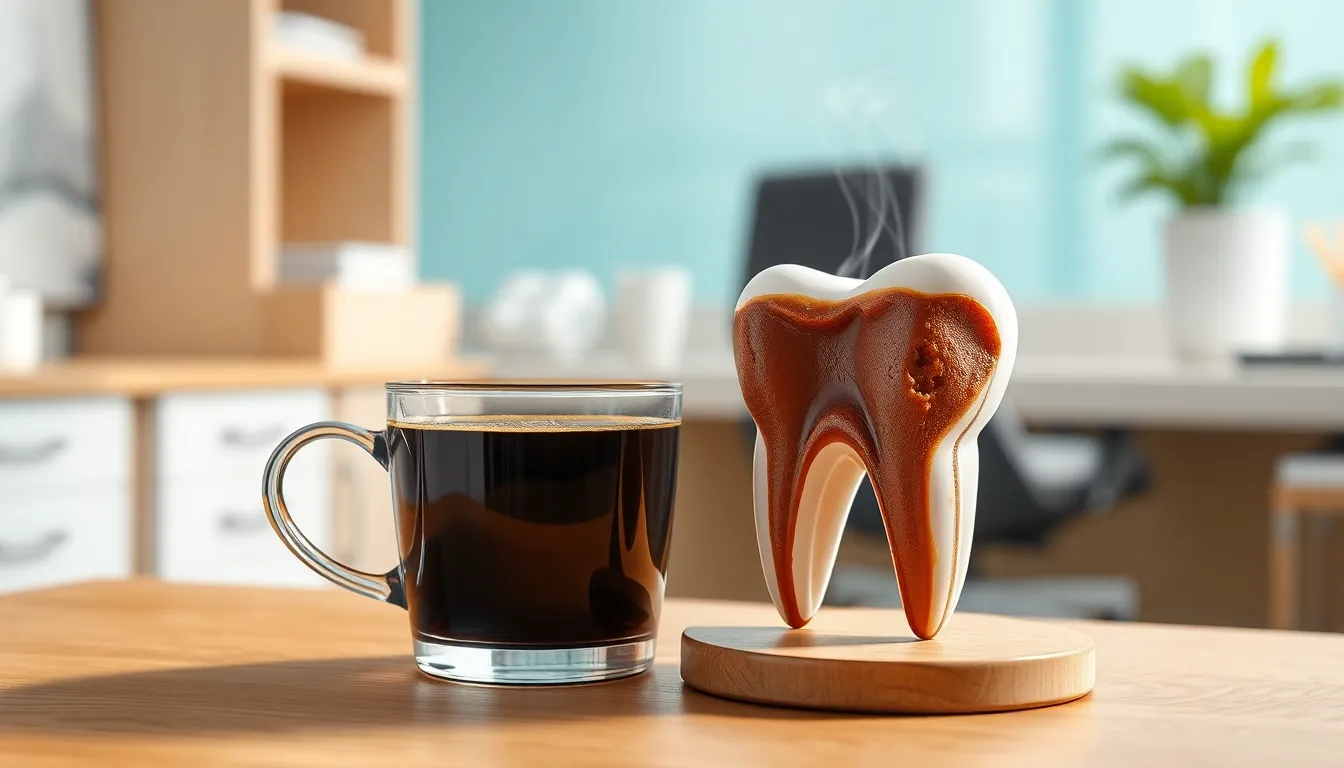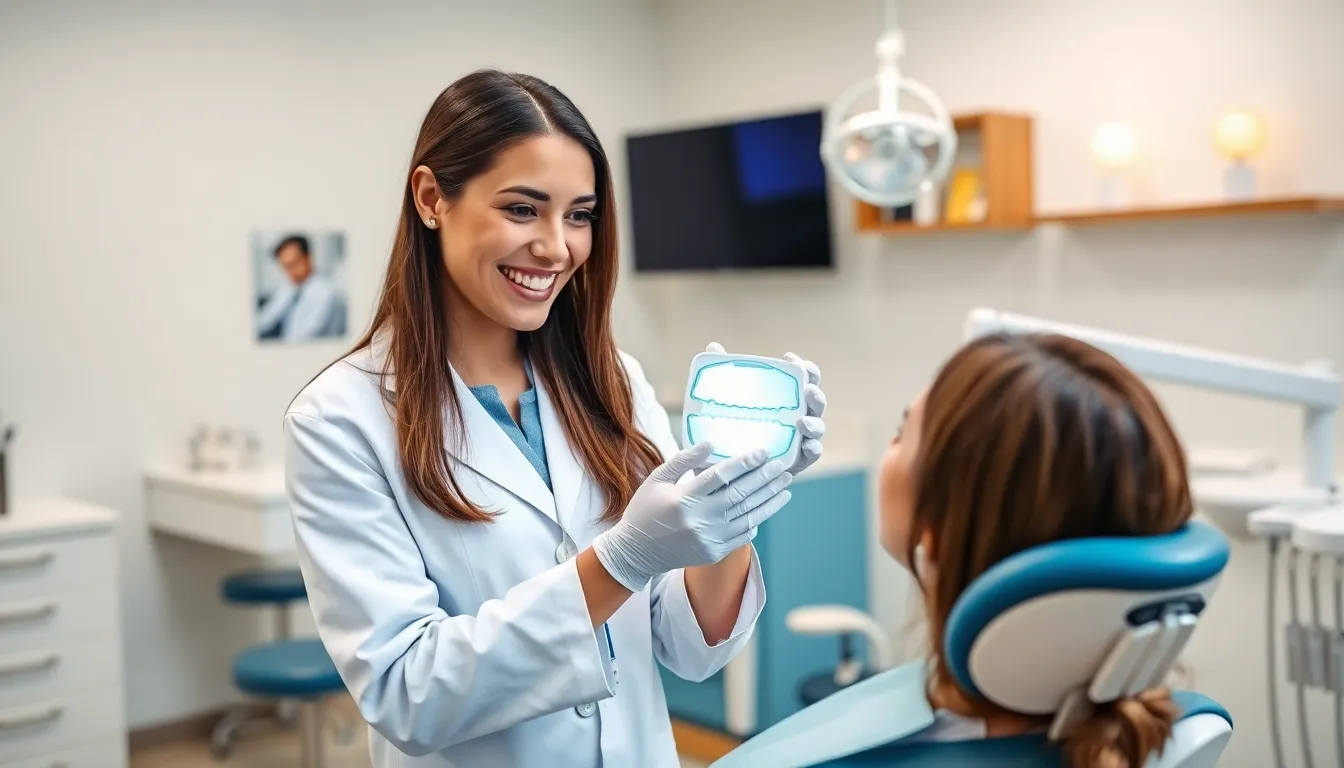Slow Cooker Recipes: Easy Meals, Less Effort!
Family-friendly dishes for busy people — quick prep, delicious results.
Grab yours for $4Is coffee bad for your teeth? If you’re one of the millions who can’t start their day without a cup of joe, this question has likely crossed your mind while sipping your morning brew.
Coffee lovers often worry about those stubborn brown stains that appear over time, but the relationship between coffee and dental health goes beyond just aesthetics. While your favorite caffeinated beverage does contain acids and compounds that can affect your teeth, the reality isn’t as straightforward as you might think. Understanding how coffee impacts your dental health—and what you can do about it—can help you enjoy your daily ritual without sacrificing your smile.
How Coffee Affects Your Dental Health
Coffee impacts your teeth in multiple ways beyond just staining. The acidic nature of coffee erodes enamel over time, making teeth more susceptible to decay and sensitivity. This erosion process happens gradually with regular consumption, especially when you drink coffee throughout the day rather than during a single sitting.
Tannins in coffee are responsible for the characteristic brown stains that develop on teeth. These compounds bind to dental enamel and create discoloration that’s difficult to remove with regular brushing. Dark roasts typically contain higher concentrations of these staining compounds than lighter varieties.
Coffee’s effect on saliva production further complicates its relationship with dental health. Caffeine can reduce saliva flow, creating a drier mouth environment where bacteria thrive. Saliva naturally neutralizes acids and washes away food particles, so decreased production leaves teeth more vulnerable to decay.
Adding sugar, syrups, or cream to your coffee introduces additional dental risks. These additives feed harmful oral bacteria that produce enamel-damaging acids. Sweetened coffee preparations can dramatically increase your risk of cavities compared to drinking it black.
Temperature fluctuations from hot coffee can also create microfractures in dental enamel over time. These tiny cracks might not be immediately noticeable but can lead to increased sensitivity and provide pathways for staining agents to penetrate deeper into teeth.
The Staining Power of Coffee

Coffee stains teeth primarily due to its high concentration of chromogens—pigmented compounds that adhere strongly to dental enamel. These compounds penetrate the porous surface of your teeth, creating noticeable discoloration over time, especially if your enamel is already weakened or eroded.
Why Coffee Causes Tooth Discoloration
The acidic nature of coffee contributes significantly to enamel erosion, making your teeth more vulnerable to staining agents like chromogens. Tannins, another compound found in coffee, enhance the ability of stains to stick to your tooth surface. Your morning cup might seem less harmful when you add milk, which can slightly moderate the staining potential, but regular coffee consumption typically results in visible tooth discoloration regardless.
Coffee doesn’t directly cause cavities, though it creates an oral environment where bacteria can flourish, particularly when you add sugar. Interestingly, coffee contains polyphenols with antibacterial properties that combat plaque-causing bacteria and potentially reduce risks of oral diseases and even oral cancer. These benefits diminish considerably when you consume coffee with sugar or cream.
Other Beverages That Stain Teeth
Tea rivals coffee in staining power, particularly black and green varieties containing similar tannins that discolor teeth. Red wine poses another important threat to your smile due to its dark pigments and acids that erode enamel. Dark-colored sodas and fruit juices contribute to tooth discoloration through their high acidity and artificial colorants that attach to dental surfaces.
These beverages share common characteristics with coffee—acidity that erodes protective enamel and colored compounds that leave behind stains. Each drink affects your teeth through the same mechanism of weakening enamel and depositing colored molecules that change tooth appearance with regular consumption.
Coffee’s Impact on Tooth Enamel

Coffee poses important challenges to your dental health, particularly affecting tooth enamel. The acidic nature of coffee creates a continuous erosive environment that gradually compromises enamel integrity over time with regular consumption.
Acidity Levels in Coffee
Coffee contains moderate acidity levels that can damage your teeth’s protective outer layer. Research shows coffee ranks as the second most erosive hot beverage, with an erosive effect of approximately 29% on tooth enamel. This places it behind only highly acidic drinks like CocaCola (37% erosive effect) but still makes it concerning for dental health. The pH of coffee falls below neutral, creating an environment where demineralization occurs more readily than remineralization. Each cup you drink exposes your teeth to this acid attack, with the cumulative effect becoming more pronounced for frequent coffee drinkers.
How Acid Erodes Enamel Over Time
Acid erosion operates through a demineralization process that gradually dissolves enamel’s mineral components. When you drink coffee, its acids interact with your tooth surface, softening the enamel and increasing its roughness. This repeated exposure leads to progressive structural weakening as the protective barrier breaks down. Your teeth become more vulnerable to sensitivity and decay as the enamel thins. Adding sugar or cream to your coffee compounds these problems—sweeteners feed plaque bacteria that produce additional acids, creating a double attack on your enamel. The erosion process accelerates when coffee is consumed throughout the day rather than in a single sitting, giving your teeth less recovery time between acid exposures.
Coffee Additives and Your Teeth

What you add to your coffee significantly impacts your dental health, often more than the coffee itself. These additives can transform a potentially tooth-friendly beverage into one that actively contributes to dental problems.
Sugar’s Role in Tooth Decay
Sugar dramatically increases coffee’s potential to damage your teeth. When you add sugar to your coffee, you’re introducing fermentable carbohydrates that oral bacteria eagerly consume. These bacteria metabolize sugar and produce acids as a byproduct, creating an acidic environment that accelerates tooth decay. The combination of coffee’s natural acidity with sugar-produced acids forms a double threat to your enamel. Research shows that the cavity risk from coffee increases substantially with each teaspoon of sugar added. Bacteria thrive on these sugars for up to 30 minutes after consumption, continually producing harmful acids that attack your teeth. Switching to sugar alternatives doesn’t completely solve the problem, as many artificial sweeteners still feed certain types of oral bacteria.
Creamer and Milk Effects
Adding dairy or non-dairy creamers to coffee creates complex dental health implications. Cream and milk diminish coffee’s natural antibacterial properties by neutralizing the beneficial polyphenols that kill cavity-causing bacteria. Studies demonstrate that black coffee extracts, particularly from Robusta beans, can kill dental plaque bacteria almost instantly, but this effect decreases significantly when cream is added. Milk proteins bind to coffee’s polyphenols, reducing their effectiveness against oral bacteria by up to 60%. But, dairy products do offer some protective benefits through calcium and phosphate content, which can help remineralize teeth. Non-dairy creamers typically lack these minerals and often contain added sugars or sweeteners that further increase decay risk. The fat in creamers can also create a film on teeth that traps coffee’s staining compounds against the enamel surface, intensifying discoloration over time.
Ways to Enjoy Coffee While Protecting Your Teeth

Coffee’s impact on dental health doesn’t mean you need to give up your favorite brew. With the right approach, you can minimize potential damage while still enjoying your daily cup.
Drinking Techniques to Minimize Damage
Black coffee offers the best protection for your teeth due to its natural antibacterial properties. Drinking your coffee without additives preserves beneficial polyphenols that fight decay-causing bacteria. Using a straw positions the liquid toward the back of your mouth, reducing direct contact with your front teeth and minimizing staining. Limiting consumption to two cups daily significantly decreases your risk of enamel erosion and discoloration. Rinsing your mouth with water immediately after finishing your coffee helps neutralize acids and wash away tannins before they can settle into enamel pores.
Post-Coffee Dental Care Habits
Regular brushing for two minutes twice daily forms the foundation of good dental hygiene for coffee drinkers. Timing matters—wait approximately 30 minutes after coffee consumption before brushing to prevent damage to acid-softened enamel. Professional dental cleanings remove stubborn coffee stains that regular brushing can’t address. ADA-approved whitening toothpastes and strips combat existing discoloration without damaging enamel. Occasional brushing with baking soda provides a natural whitening alternative that’s gentle yet effective. Electric toothbrushes remove plaque more efficiently than manual brushes, helping maintain enamel integrity against coffee’s acidic effects.
Professional Solutions for Coffee Drinkers

Dental professionals offer several effective answers to address the dental challenges coffee drinkers face. Regular dental visits play a crucial role in maintaining oral health for coffee lovers, with exact treatments designed to combat staining and protect enamel from coffee’s acidic effects.
Teeth Whitening Options
Professional whitening treatments provide powerful answers for removing stubborn coffee stains that home care alone can’t address. In-office bleaching procedures deliver dramatic results in a single visit, using higher-concentration whitening agents that aren’t available over the counter. Custom home whitening trays, professionally fitted by your dentist, offer a convenient alternative that provides gradual whitening with less sensitivity. ADA-approved whitening products like Crest 3D White toothpaste and whitening strips represent effective at-home options to maintain brightness between professional treatments. These professional-grade answers target the tannins in coffee that bind to tooth surfaces, breaking down these stain molecules more effectively than regular brushing.
Protective Dental Treatments
Preventive treatments from your dentist can significantly reduce coffee’s damaging effects on tooth enamel. Fluoride treatments strengthen enamel by remineralizing areas weakened by coffee’s acidity, creating a more resistant surface against future erosion. Dental sealants offer another protective option, forming a physical barrier over vulnerable tooth surfaces to prevent acidic coffee from contacting enamel directly. Professional dental cleanings twice yearly remove accumulated coffee stains and tartar buildup, preventing long-term discoloration and promoting overall oral health. These protective measures work best when combined with consistent at-home care, creating a comprehensive approach to maintaining dental health for coffee enthusiasts.
Conclusion
Coffee isn’t inherently bad for your teeth but requires mindful consumption. The acidic nature erosive effects and staining potential can impact dental health over time. But you can still enjoy your daily brew without sacrificing your smile.
By drinking black coffee using a straw rinsing afterward and maintaining good oral hygiene you’ll minimize potential damage. Limiting added sugars and dairy alternatives further protects your enamel from erosion and discoloration.
Remember that regular dental checkups professional cleanings and appropriate whitening treatments play crucial roles in counteracting coffee’s effects. With these preventive measures you can continue to enjoy your coffee while keeping your teeth healthy and bright.
Frequently Asked Questions
Does coffee stain your teeth?
Yes, coffee can cause brown stains on teeth due to its high concentration of chromogens (pigmented compounds) that adhere to dental enamel. These stains become more pronounced over time with regular consumption, especially when enamel is weakened by coffee’s acidity. Dark roasts typically contain higher levels of tannins, which contribute more significantly to discoloration.
How does coffee affect tooth enamel?
Coffee has a moderate acidity level that can erode tooth enamel over time. It causes approximately a 29% erosive effect on enamel through demineralization, making teeth more vulnerable to sensitivity and decay. This erosion is particularly problematic with frequent consumption throughout the day, as teeth have less time to recover from acid exposure.
Can coffee cause cavities?
Coffee itself doesn’t directly cause cavities, but it creates conditions favorable for cavity development. It reduces saliva production, leading to a drier mouth where bacteria thrive. When sugar is added to coffee, the risk increases significantly as oral bacteria feed on these carbohydrates and produce harmful acids that attack enamel. Each teaspoon of sugar substantially raises cavity risk.
Is black coffee better for teeth than coffee with cream and sugar?
Yes, black coffee is better for dental health. It contains polyphenols with antibacterial properties that can combat plaque-causing bacteria. Adding sugar provides fuel for harmful bacteria, while cream and milk can neutralize coffee’s beneficial polyphenols. Additionally, fat in creamers can trap staining compounds against the enamel, intensifying discoloration over time.
How can I enjoy coffee without damaging my teeth?
Drink black coffee when possible and use a straw to minimize contact with teeth. Limit consumption to two cups daily and rinse your mouth with water afterward to neutralize acids. Wait 30 minutes before brushing to avoid damaging softened enamel. Consider regular professional cleanings and use ADA-approved whitening products for stain management. Occasional brushing with baking soda offers gentle whitening.
Are there professional dental solutions for coffee drinkers?
Yes, dental professionals offer several solutions for coffee drinkers. These include professional whitening treatments (in-office bleaching and custom home whitening trays), preventive treatments like fluoride applications and dental sealants to strengthen enamel, and regular dental cleanings to remove coffee stains and tartar buildup. These professional measures, combined with consistent at-home care, help maintain dental health.
How does coffee compare to other beverages that stain teeth?
Coffee, tea, red wine, dark sodas, and fruit juices all share similar staining characteristics. They contain colored compounds and acids that contribute to tooth discoloration. Coffee’s high concentration of chromogens makes it particularly effective at staining, especially with regular consumption. While some beverages may have higher acidity or sugar content, coffee’s combination of staining compounds and moderate acidity presents unique challenges to dental health.
Should I brush my teeth immediately after drinking coffee?
No, you should wait approximately 30 minutes after drinking coffee before brushing. Coffee’s acidity temporarily softens enamel, and brushing too soon can damage this weakened enamel. Instead, rinse your mouth with water immediately after coffee to neutralize acids and wash away tannins, then brush later when enamel has remineralized. Using an electric toothbrush provides more effective plaque removal.







